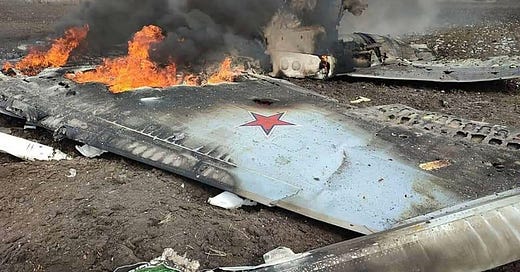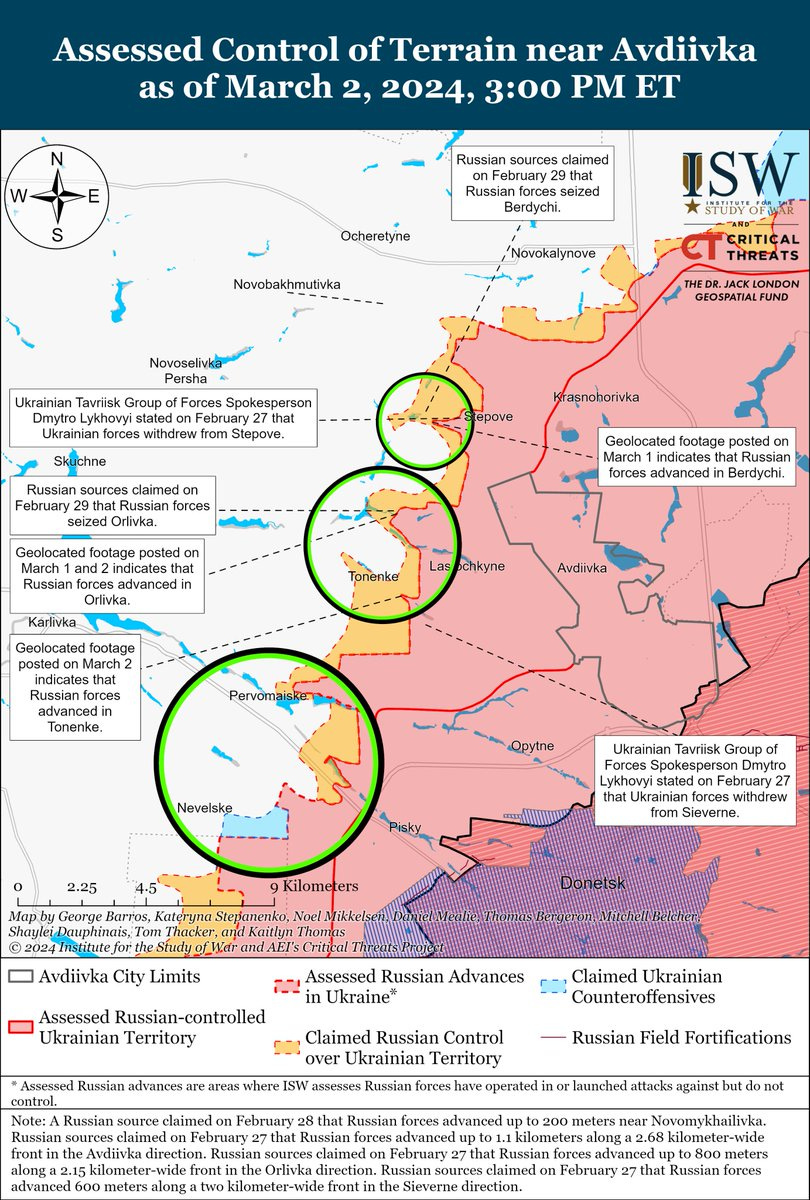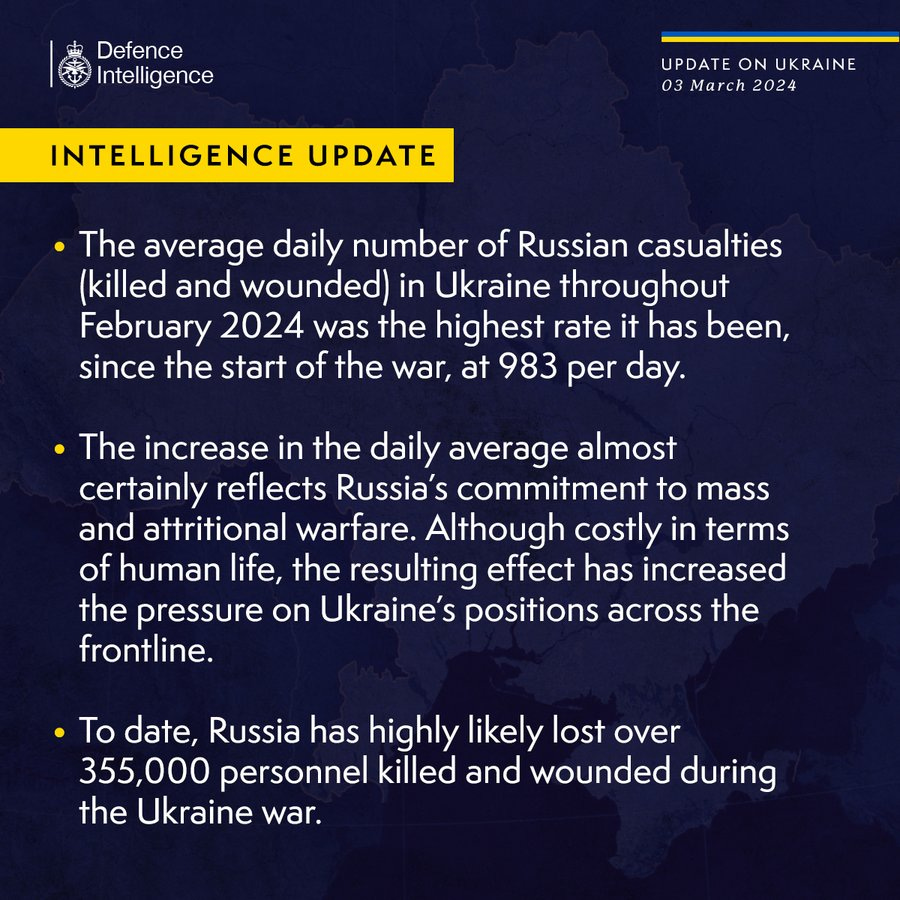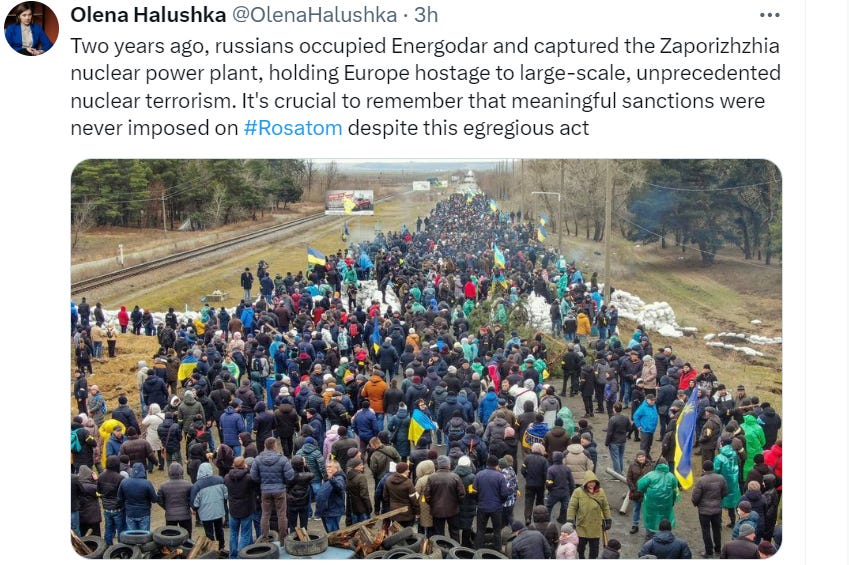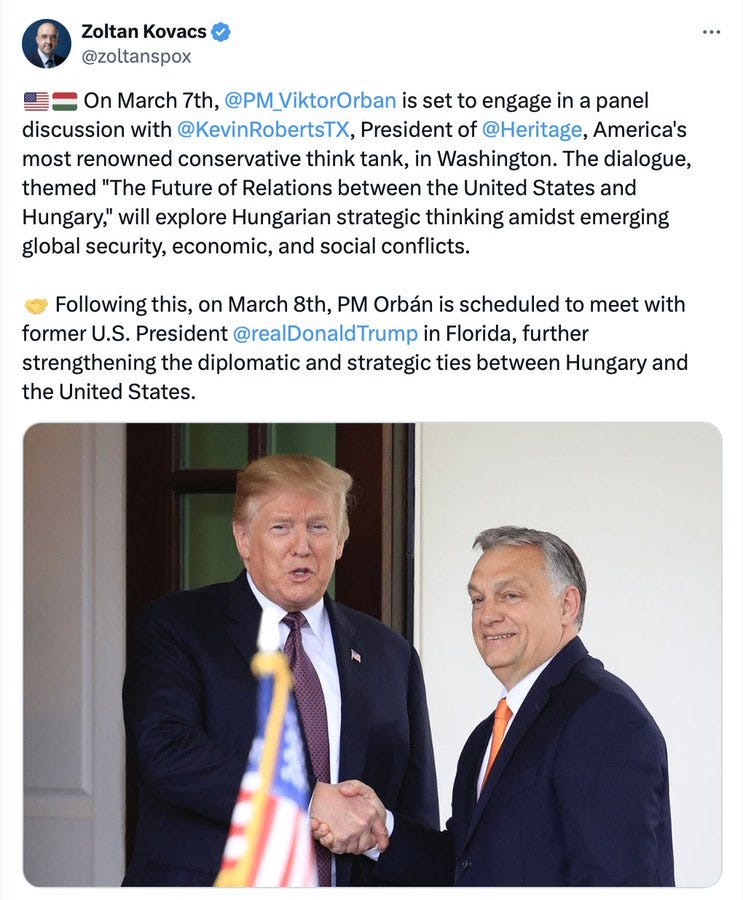Mar : E-Stories
Day739 Zabrisky CombatSit Crimea Avdiivka BehindLines Poland InRussia Allies A&P Byline Scherba Iacoboni Panyi Weiss UKDef ISW CDS Trad Speck Amanpour Halushka
Catching up…
EA Worldview’s Ukraine Up-date- hop over to Scott’s amazing hourly Ukraine up-date page. I’ll fill in with some bits and bobs.
Stories we’re following…
The Russians launched an Iskander-M missile on Pokrovsk (Donetsk Oblast) on Sunday, 3 March at 06:30, injuring civilians, with residential buildings at the epicentre of the explosions, the Donetsk Oblast Prosecutor’s Office reported on Facebook.
In Pokrovsk, two women aged 24 and 52 were wounded by shrapnel. Along with apartment buildings, the strike damaged cars and a gas main. In addition, on the night of 2-3 March, Russian forces launched a large-scale missile attack on Myrnohrad, firing four S-300 missiles. The invaders targeted a densely built-up residential area.
Zarina Zabrisky in Kherson on Mar 3—Over the past 24 hours, Russian troops’ crimes: 21 settlements shelled in Kherson region 3high-rises, 15 houses, a post office damaged 1 killed 1 injured - [during this shoot, nearby]
CDS: In February, Russian forces shelled civilian areas in the Kherson community nearly 500 times, resulting in the deaths of 7 people and injuries to 26 others.
Combat Situation Update
The Avdiivka sector situation is stabilizing, although the Russian army is still having "local successes," Tavria Operational-Strategic Group spokesman Dmytro Lykhoviy said on national television on Mar. 3.
CDS: On the Kupyansk and Lyman directions, Russian troops have been conducting between 10 to 15 glide bomb strikes per day over the past several months.
The Russian forces usually launch their attacks in waves, employing groups ranging from one to one and a half infantry companies, and occasionally even up to a battalion tactical group (BTG), although they still significantly constrain the number of armored vehicles used.
On the Bakhmut direction, fighting continues in Bohdanivka and Ivanivka. Positional battles persisted near Berestove, Klishchiivka, Andriivka, Kurdyumivka, Pivdenne, and New York.
The enemy is attempting to execute a deep encirclement of the left flank of the "Tavriya" OSG, which is defending in the Kurakhove-Vuhledar salient.
On the Novopavlivka direction, positional battles have been ongoing in the areas of Krasnohorivka, Heorhiivka, Novomykhailivka, and Pobieda.
Michael Weiss: Russia advances in spite of catastrophic losses because it throws everything into even tactically negligible victories. Meanwhile, life-saving kit, which would enable Ukraine to hold the line, is denied because of American ideologues and con artists.
Behind the Lines
An anti-Russian, Crimean Tatar-led underground group, ATESH, have claimed large explosions have destroyed a pipeline, causing “colossal” damage, in Russian-occupied Crimea, Associated Press reports.
Loud explosions were heard near an oil depot in the early hours of Sunday, according to a local pro-Kyiv Telegram news channel, while Kremlin-installed officials in the territory said that a nearby stretch of highway was closed to traffic for over eight hours.
Videos shared with pro-Ukrainian channel Crimean Wind showed explosions lighting up the night sky, followed by loud booms. The channel said they were taken by local residents near Feodosia — a coastal town in northeastern Crimea. It was not immediately possible to verify the circumstances in which the videos were shot.
CDS: In Donetsk Oblast, the police team known as the "White Angels" evacuated a family of six, including two children, from the shelled city of Toretsk, located just 300 meters from the front line. However, there are still 17 children remaining in the city.
As of February 29, 2024, in the temporarily occupied Crimea, Russian occupation administrations initiated 699 investigations related to "discrediting the Russian Armed Forces." Among these, administrative fines were imposed in 612 cases.
Ukrainian-Polish border: In addition to blocking military equipment, saboteurs also throw eggs and firecrackers at Ukrainians, as well as destroy their cars and break glass.
Me: We still don’t have any conclusive evidence that the Russians are behind the truckers blockade at the Polish border. They are probably involved in some way or it could also be other malign agents acting on behalf the Kremlin (organised crime syndicates).
What we do know from past operations is that Russian malign actors foment divisions over an issue within national interest groups, and then take advantage of any disruptive activity once that has been triggered by authentic national groups. They create the crisis, sit back and watch, and then enter when it seems as if it’s a legitimate protest. This is why it’s so difficult to unmask this activity, and bring evidence forward.
Szabolcs Panyi: “Meanwhile, Orbán and his government refused to welcome a recent bipartisan US congressional delegation and they are attacking the US ambassador to Hungary (whom Orbán is also not meeting) regularly.”
Turkey believes it is time for ceasefire talks to start in Ukraine, its foreign minister, Hakan Fidan, said at a press conference on Sunday, Reuters reports.
“A dialogue for a ceasefire (in Ukraine) should start. That doesn’t mean recognising the occupation (by Russia), but issues of sovereignty and ceasefire should be discussed separately,” Fidan said.
He was speaking at the close of a diplomacy forum in the southern city of Antalya. The Antalya Diplomacy Forum (ADF) began in 2021 as a place for policymakers, businessmen, researchers and academics to exchange ideas and views.
Meanwhile in Russia
Steve Rosenberg for BBC News in Moscow: “The scene at Moscow’s Borisovskoye cemetery this morning. Russians continue to place flowers on the grave of Alexei Navalny. There’s now a mountain of floral tributes to the late opposition leader.”
Journalist Ihar Karnei to be tried in Belarus for 'participation in extremist group.' Ihar Karnei, a former freelance journalist with Radio Svaboda, the Belarus service of the U.S. Congress-funded broadcaster Radio Free Europe/Radio Liberty (RFE/RL), will be tried in Minsk on March 19.
Vladimir Kara-Murza is one of Russia’s most high profile political prisoners. He is a British citizen, yet his wife Evgenia Kara-Murza tells Carole Cadwalladr in today’s Observer that it has taken her two years to secure a meeting with the UK government. Cadwalladr writes:
Hours after Alexei Navalny was buried in Moscow, his body brought from a grim Siberian jail, Evgenia Kara-Murza, who is married to another Russian opposition leader serving a 25-year sentence in another grim Siberian jail, is perfectly composed.
On Friday, images of Navalny’s body in an open casket were beamed around the world, but if these scenes had brought home to Evgenia Kara-Murza the risk to her husband and her family, she wasn’t showing it.
In fact, she’s fresh out of a meeting with Britain’s foreign secretary, David Cameron. “I was actually with him when the funeral was taking place,” she says. “It was arranged two weeks ago so it was a total coincidence. But can you believe it’s taken two years for the British government to meet with me? It took them a year to make even a statement about his arrest.”
It’s a fact that Bill Browder, an American businessman turned activist calls “utterly shameful”, not least because Vladimir Kara-Murza is a British citizen. Since Navalny’s death, he’s the most high-profile politician imprisoned in Russia but he spent his teenage years in Britain after his mother married an Englishman, studying at Cambridge University before returning to Moscow. [continue]
SPRAVDI Stratcom Centre: Former head of Russian propaganda network Sputnik Lithuania confirms that they foment riots in European countries specifically mentioning an operation in Lithuania and the Yellow Vests in France. Russian propagandists are appendages of a terrorist state and should be prosecuted as such.
Former Italian Prime Minister Giuseppe Conte is right up their with his Slovakian and Hungarian colleagues in bringing home the Russian message of unilateral disarmament of Ukraine. His party, Movimento 5 Stelle, was supposed to sign the same protocol as Lega signed with United Russia in 2017, but at the last minute it didn’t because Iacoboni published the news, which caused a scandal. M5S has maintained ties to the Kremlin via middlemen who publish on Rumble almost everyday. Also a reminder that Conte’s right hand man, Stefano di Manlio, travelled to Moscow over 20 times in 2019, and presented a motion in the Italian parliament which put Italy’s NATO membership in question. Conte put Italian and NATO security at risk again in 2020 when he invited Russian military, accompanied by GRU agents, to traipse freely in Italy under the guise of Covid aid—’From Russia with Love’.
Allied Support
Danish PM Mette Frederiksen at a conference in Italy about aid to Ukraine and the need to increase defence spending across EU member states:
On the lighter side: In 2009, Georgia was disqualified from Eurovision because their song submission "We Don't Want to Put In" (We Don't Want Putin) was deemed too political. In lightly coded language, the disco song's chorus calls for assassinating Vladimir Putin:
Ulrich Speck: Future Ukrainian Security
It's simple: Putin is dead-set to destroy Ukraine as an independent state and nation. Whether he achieves this through war or Minsk-like agreements, is secondary for him. Of course he prefers a less costly agreement.
Each agreement for Putin is fine as long as it makes sure that Ukraine cannot resist to Russian pressure in the future.
If there will an agreement, more or less explicit, on a new status quo, the one thing that matters is that Russia can't attack or intimidate Ukraine again.
One way to achieve this is by "arming Ukraine to the teeth", ultimately even getting a nuclear weapon to guarantee the existence of Ukraine.
The other option is that the West credibly promises to defend Ukraine by threatening Russia with war when it attacks Ukraine again, including extended nuclear deterrence. All that can't be done credibly by Europeans alone, only by the US. This option is called Nato membership.
At the moment, Ukraine is on neither of both paths. The West is not ready to make Ukraine a Nato member and to provide credible guarantees for the time in between. This is unlikely to change in the near- and mid-term.
At the same time, the West has not started to "arm Ukraine to the teeth", by systematically building up Ukraine's armed forces; there are some vague plans but no strong commitments and not much action.
The West has no plan, the attitude is very much wait and see. Or may be cut a deal with Russia and all will be fine again -- repeating the mistake of Minsk II which led to the all-out attack in February 2022.
Without a clear plan, without clear commitment, the West sends the signal to Russia that it is not fully committed to Ukraine's existence. Attempts to create "strategic ambiguity" that come out of the blue don't really change that.
Only when Europeans -- the US might not be part of the coalition after US elections -- commit themselves seriously to building up Ukraine's armed forces, Putin will start to believe that he can't achieve his goal to destroy Ukraine as a state and a nation. We're not there yet.
Helping Ukraine saving itself against Russia is currently the most important European security interest. Only when Russia fails in Ukraine it may change course and not become an imperialist, militarized power that threatens Europe for the decades to come.
European countries, by arming Ukraine, can stop the new hot-cold war that is breeding by asserting the European peace order -- which is based on safe borders and the principle that countries can't just attack peaceful neighbors at will.
The investment and the risk by doing this today is minuscule compared to what is likely to happen if Europeans fail to give Ukraine the weapons and ammunitions it needs.
At the same time, Europeans must move towards a posture of containment, defense and deterrence elsewhere, denying Russia systematically opportunities to increase its influence and power.
To sum up: Ukraine is the place where the future character of the European order is being decided.
Russia has gone full-in, Europeans beyond the arc of containment (Northern Europe and Central Europe) are still hesitating, which prolongs the war and increases the risks.
Christiane Amanpour: Quit the clickbait and get back to issues. Margaret Sullivan calls out the “destructive obsession” with Joe Biden’s age. “I wonder whether people are as aware of Trump's authoritarian plans as they are of Biden's age? And I think the answer to that is pretty clearly no," she argues.
I’ve grown up in the close company of my grandparents and now my parents. They all worked, and are working late into their lives for different reasons. My parents are 82 and 86, and both work full time running a business. In addition to her business, my Mom is still a political operative. They have their health issues, which is normal given their age but let’s be honest: most of us have issues once we’re past 60. What I admire about them is that their minds are inquisitive, and sharp, and they’re innovative in their own ways.
I had a conversation with my Mom yesterday that illustrates what her generation is all about, and which brings home what the real issues are. She was prepping for a meeting with an Italian dignitary, let’s say, ‘Ms Rossi’.
Mom: What did ‘Ms Rossi’ achieve before her current position? What has she done?
Me: Well…she’s been in politics a long time.
Mom: No, I was asking what she has accomplished in her life in politics.
Frankly put, I couldn’t answer my Mom’s question.
That’s the key isn’t it: what a politician has done in service to their citizens and country while in office. Politicians should be judged on the merit of what they have brought to communities, not they’re social media posts or how much ill-begotten coverage they get in the press who’s hungry to get the next scandalous or irrelevant scoop.
This is Margaret Sullivan’s message: we should be talking about the issues in this election, and if they have been resolved or if there’s an idea that can be discussed on how to resolve them. What is Joe Biden bringing to the electorate, and what has he achieved in the past four years?
Have we forgotten what elections are really all about?
Programming notes…
Reporter Zarina Zabrisky, who’s been covering the conflict from Ukraine for the Byline Times, has been talking to politicians, military experts, artists and 'ordinary' people to get a sense of how Ukraine is dealing with the conflict. The episode is narrated by her colleague, the war photographer Paul Conroy.

